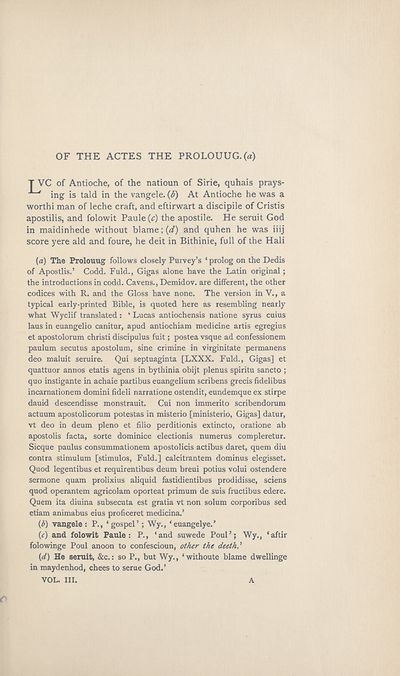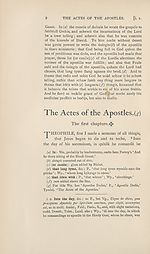Download files
Complete book:
Individual page:
Thumbnail gallery: Grid view | List view

OF THE ACTES THE PROLOUUG.(a)
/C of Antioche, of the natioun of Sirie, quhais prays-
ing is tald in the vangele. (b) At Antioche he was a
worthi man of leche craft, and eftirwart a discipile of Cristis
apostilis, and folowit Paule {c) the apostile. He seruit God
in maidinhede without blame; {d) and quhen he was iiij
score yere aid and foure, he deit in Bithinie, full of the Hali
(a) The Prolouug follows closely Pui vey’s ‘prolog on the Dedis
of Apostlis.’ Codd. Fuld., Gigas alone have the Latin original ;
the introductions in codd. Cavens., Demidov, are different, the other
codices with R. and the Gloss have none. The version in V., a
typical early-printed Bible, is quoted here as resembling nearly
what Wyclif translated : ‘ Lucas antiochensis natione syrus cuius
laus in euangelio canitur, apud antiochiam medicine artis egregius
et apostolorum christi discipulus fuit; postea vsque ad confessionem
paulum secutus apostolum, sine crimine in virginitate permanens
deo maluit seruire. Qui septuaginta [LXXX. Fuld., Gigas] et
quattuor annos etatis agens in bythinia obijt plenus spiritu sancto ;
quo instigante in achaie partibus euangelium scribens grecis fidelibus
incarnationem domini fideli narratione ostendit, eundemque ex stirpe
dauid descendisse monstrauit. Cui non immerito scribendorum
actuum apostolicorum potestas in misterio [ministerio, Gigas] datur,
vt deo in deum pleno et filio perditionis extincto, oratione ab
apostolis facta, sorte dominice electionis numerus compleretur.
Sicque paulus consummationem apostolicis actibus daret, quern diu
contra stimulum [stimulos, Fuld.] calcitrantem dominus elegisset.
Quod legentibus et requirentibus deum breui potius volui ostendere
sermone quam prolixins aliquid fastidientibus prodidisse, sciens
quod operantem agricolam oporteat primum de suis fructibus edere.
Quern ita diuina subsecuta est gratia vt non solum corporibus sed
etiam animabus eius proficeret medicina.’
{b) vangele : P., ‘ gospel’; Wy., ‘euangelye.’
(r) and folowit Paule: P., ‘and suwede Poul’; Wy., ‘aftir
folowinge Poul anoon to confescioun, other the deeth.1
(rf) He seruit, &c.: so P., but Wy., ‘withoute blame dwellinge
in maydenhod, chees to serue God.’
VOL. III. A
C
/C of Antioche, of the natioun of Sirie, quhais prays-
ing is tald in the vangele. (b) At Antioche he was a
worthi man of leche craft, and eftirwart a discipile of Cristis
apostilis, and folowit Paule {c) the apostile. He seruit God
in maidinhede without blame; {d) and quhen he was iiij
score yere aid and foure, he deit in Bithinie, full of the Hali
(a) The Prolouug follows closely Pui vey’s ‘prolog on the Dedis
of Apostlis.’ Codd. Fuld., Gigas alone have the Latin original ;
the introductions in codd. Cavens., Demidov, are different, the other
codices with R. and the Gloss have none. The version in V., a
typical early-printed Bible, is quoted here as resembling nearly
what Wyclif translated : ‘ Lucas antiochensis natione syrus cuius
laus in euangelio canitur, apud antiochiam medicine artis egregius
et apostolorum christi discipulus fuit; postea vsque ad confessionem
paulum secutus apostolum, sine crimine in virginitate permanens
deo maluit seruire. Qui septuaginta [LXXX. Fuld., Gigas] et
quattuor annos etatis agens in bythinia obijt plenus spiritu sancto ;
quo instigante in achaie partibus euangelium scribens grecis fidelibus
incarnationem domini fideli narratione ostendit, eundemque ex stirpe
dauid descendisse monstrauit. Cui non immerito scribendorum
actuum apostolicorum potestas in misterio [ministerio, Gigas] datur,
vt deo in deum pleno et filio perditionis extincto, oratione ab
apostolis facta, sorte dominice electionis numerus compleretur.
Sicque paulus consummationem apostolicis actibus daret, quern diu
contra stimulum [stimulos, Fuld.] calcitrantem dominus elegisset.
Quod legentibus et requirentibus deum breui potius volui ostendere
sermone quam prolixins aliquid fastidientibus prodidisse, sciens
quod operantem agricolam oporteat primum de suis fructibus edere.
Quern ita diuina subsecuta est gratia vt non solum corporibus sed
etiam animabus eius proficeret medicina.’
{b) vangele : P., ‘ gospel’; Wy., ‘euangelye.’
(r) and folowit Paule: P., ‘and suwede Poul’; Wy., ‘aftir
folowinge Poul anoon to confescioun, other the deeth.1
(rf) He seruit, &c.: so P., but Wy., ‘withoute blame dwellinge
in maydenhod, chees to serue God.’
VOL. III. A
C
Set display mode to: Large image | Zoom image | Transcription
Images and transcriptions on this page, including medium image downloads, may be used under the Creative Commons Attribution 4.0 International Licence unless otherwise stated. ![]()
| Publications by Scottish clubs > Scottish Text Society publications > Old series > New Testament in Scots > Volume 3, 1905 > (19) |
|---|
| Permanent URL | https://digital.nls.uk/107414867 |
|---|
| Description | Volume 3. Actes-Apocalipsis, Epistles of the Ald Testament. |
|---|---|
| Attribution and copyright: |
|
| Description | A collection of over 100 Scottish texts dating from around 1400 to 1700. Most titles are in Scots, and include editions of poetry, drama, and prose by major Scottish writers such as John Barbour, William Dunbar, Gavin Douglas, and George Buchanan. Edited by a key scholarly publisher of Scotland's literary history, and published from the late 19th century onwards by the Scottish Text Society. Available here are STS series 1-3. |
|---|

